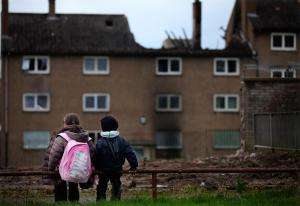Child poverty on the rise warning

Professional Social Work magazine - 22 October, 2020
Ministers voted against free school meals during holidays for the most disadvantaged in England a week after research showed worrying rises in child poverty.
It also comes in the wake of warnings of an “inter-generational crisis” as a result of Covid and a call for a "recovery package" to support children by England's children's commissioner.
MPs last night rejected by 61 votes a Labour motion to provide free holiday school meals up to Easter worth £15 a week to the 1.4 million most disadvantaged children in England - a policy adopted by Wales last week.
Caroline Ansell, one of five Tory MPs rebelling against their party, stepped down as parliamentary private secretary at the Department for Environment, Food and Rural Affairs in protest.
Following the vote, England footballer and campaignter Marcus Rashford said “child food poverty has the potential to become the greatest pandemic the country has ever faced” and urged MPs to act.
However, education secretary Gavin Williamson responded by saying it is "universal credit and our comprehensive welfare system that supports families”.
Research published last wek revealed a shocking rise in child poverty in the Midlands and North of England, with many families described as 'on a cliff edge' because of the pandemic.
Dwindling household incomes and mounting rents are contributing to a squeeze on Britain's most impoverished households, said a report by End Child Poverty.
It found nearly a third (31 per cent) of all children are living in poverty in England. In Wales, child poverty stands at 28 per cent, and in Northern Ireland and Scotland the figure is nearer a quarter (25 and 24 per cent respectively).
Figures for 2014-15 to 2018-19 show a rise of nine per cent in the North East, and four per cent in the Midlands.
Tower Hamlets has the highest percentage of children in poverty in the UK, at 55.4 per cent. Birmingham has the highest proportion outside London, at 41.6 per cent, and eight out of ten authorities with the biggest increases were in the North-East.
Child poverty is defined as children living in households where the income (after housing costs) is less than 60 per cent of the median.
The report, carried out by Loughborough University's Centre for Research, combined DWP child poverty data with local housing costs to reveal the pressures on low-income families.
Figures are thought to have increased most in the North-East and Midlands because housing costs have risen disproportionately when compared to rises in income in these areas.
Anna Feuchtwang, chair of End Child Poverty, said: "This data reveals the true extent of the hardship experienced by families on low incomes - the majority of which were working households before the pandemic.
"The children affected are on a cliff edge and the pandemic will only sweep them further into danger."
Child poverty in some areas of the North East rose by more than ten percentage points, with the biggest rises in Middlesborough (12.5per cent) Newcastle (11 per cent) and South Tyneside (10.3 per cent).
Breakfast clubs - an important source of food for many children in poverty - are continuing during the pandemic but without children sitting down together - children in one Birmingham school are given a food parcel to last two weeks.
Many Birmingham schools say parents are struggling due to job losses and hardship funds are being made available, both to unemployed and working parents.
Universal Credit was increased by £20 a week at the start of the pandemic and campaigners are lobbying for the increase to stay in place. MPs from across the political spectrum are calling for the Chancellor to rethink imminent cuts to Universal Credit due in April.
The Government has said it will keep changes to benefits under review and claims there are 100,000 fewer children living in 'absolute poverty' than in 2009-10.
A report by England’s children’s commissioner Childhood in the time of Covid warns of more children at risk as a result of the pandemic.
Anne Longfield said: “Unless the government acts now, Covid-19 is in danger of becoming an inter-generational crisis, with the impact of the economic fallout on parents determining the future prospects of their children.
“After all the sacrifices children have made over the last few months, we should repay them with a comprehensive recovery package that puts their interests first.”
Preventing our lost generation - see our feature on the phlight of today's young people in November’s edition of Professional Social Work magazine
This article is published by Professional Social work magazine which provides a platform for a range of perspectives across the social work sector. It does not necessarily reflect the views of the British Association of Social Workers
